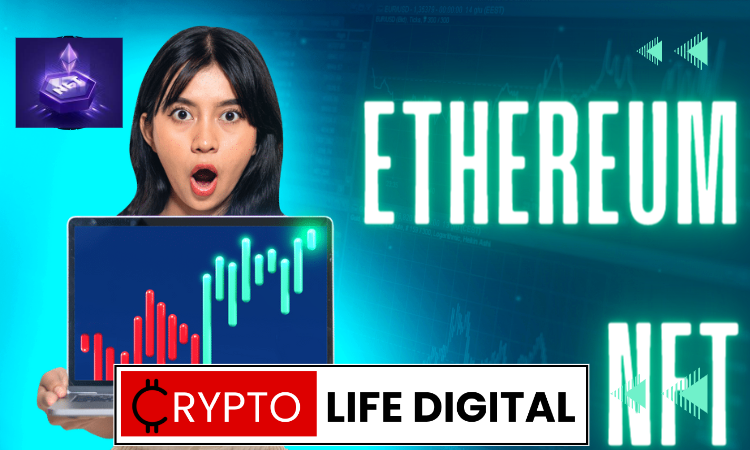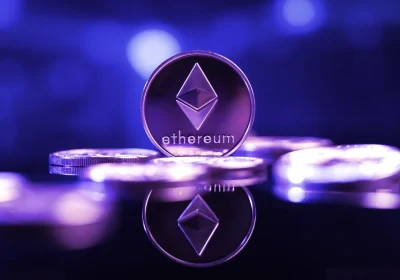Relationship Between Ethereum And NFTs

Ethereum is the most widely used blockchain platform for the creation and trading of non-fungible tokens (NFTs). NFTs have become increasingly popular in recent years, with the market for NFTs reaching over $2 billion in the first quarter of 2021. Ethereum’s smart contract functionality, security, and community make it the ideal platform for NFTs. In this article, we’ll explore why Ethereum is paramount for NFTs.
Smart Contract Functionality
Ethereum’s smart contract functionality is one of the key reasons why it is the preferred platform for NFTs. Smart contracts are self-executing contracts with the terms of the agreement between buyer and seller being directly written into lines of code. Smart contracts on Ethereum allow developers to create NFTs that are programmable, meaning they can have specific attributes, behaviours, and rules built into them.
Read Also: Ripple Announces That It Now Funding More Than 45 Universities And Over 1000 Researched Projects
For example, a developer could create an NFT that only allows the owner to access certain content or services. The smart contract can also dictate how the NFT can be transferred, how it can be used, and whether it can be replicated. This programmability enables developers to create unique and valuable NFTs that are not possible with traditional physical assets.
Ethereum’s smart contract functionality also allows for the creation of decentralized applications (dApps) that interact with NFTs. This opens up a wide range of possibilities for NFTs, including games, virtual worlds, and marketplaces.
Security
Security is a critical factor for NFTs, as they are digital assets that can be easily replicated and distributed. Ethereum’s security features, including its proof-of-work consensus mechanism, make it one of the most secure blockchain platforms in existence. Ethereum’s security has been tested and proven over several years, making it a trusted platform for NFT creators and buyers.
Ethereum’s security features also include the ability to create multi-signature wallets, which require multiple parties to sign off on a transaction before it can be executed. This feature is particularly useful for high-value NFT transactions, where multiple parties may need to sign off on the transfer of ownership.
Community
Ethereum’s community is one of the largest and most active blockchain communities in the world. This community includes developers, entrepreneurs, investors, and enthusiasts who are all working to advance the platform and its ecosystem. The community is also highly supportive of NFTs and their potential, which has led to a wide range of NFT-related projects being developed on Ethereum.
Ethereum’s community is also responsible for the creation of many of the tools and resources that are used to create and trade NFTs. These include wallets, marketplaces, and developer tools. The community’s support and involvement in the development of NFTs on Ethereum have been critical factors in their success.
Read Also: What To Know About Ripple and XRP
Ethereum Standards for NFTs
Ethereum has also developed standards for NFTs, which have helped to ensure interoperability and ease of use. The most widely used standard is ERC-721, which defines a set of rules for creating non-fungible tokens on the Ethereum blockchain. ERC-721 enables NFTs to be traded on a wide range of platforms and wallets, making it easier for buyers and sellers to transact.
Another standard, ERC-1155, is designed for the creation of both fungible and non-fungible tokens on Ethereum. This standard allows for the creation of multiple NFTs within a single smart contract, which can reduce gas fees and simplify the creation and management of NFTs.
The development of these standards has helped to establish Ethereum as the dominant platform for NFTs, as they provide a common framework that developers can use to create and trade NFTs.
In conclusion, Ethereum’s smart contract functionality, security, community, and standards have all contributed to making it the preferred platform for NFTs. The ability to create programmable NFTs using smart contracts has enabled developers to create unique and valuable digital assets that were previously not possible. Ethereum’s security features, including its proof-of-work consensus mechanism, have made it a trusted platform for NFT creators and buyers. Ethereum’s active community has been instrumental in the development of NFT-related projects and the creation of tools and resources to facilitate NFT creation and trading. Finally, the development of standards for NFTs on Ethereum has helped to establish it as the dominant platform for NFTs, enabling interoperability and ease of use across a wide range of platforms and wallets. Overall, Ethereum’s features and ecosystem have made it the ideal platform for the creation and trading of NFTs, and its dominance in the NFT market is likely to continue for the foreseeable future.
Follow us on Twitter, Facebook, Telegram, and Google News

Dr. Olajide Samuel juggles the demands of medical studies with a passion for cryptocurrency. A seasoned blogger, Olajide shares his vast global knowledge of the crypto space, offering insights to enthusiasts. Despite his busy schedule, his commitment to crypto remains strong, and he actively seeks ways to contribute to its future.









